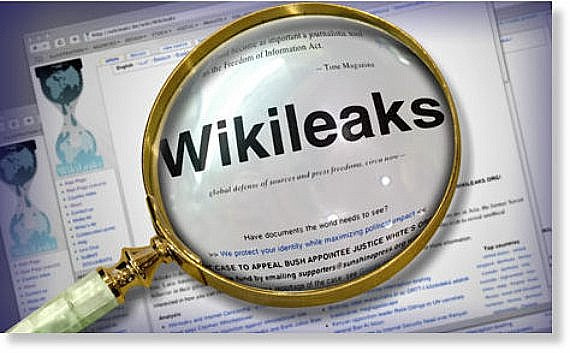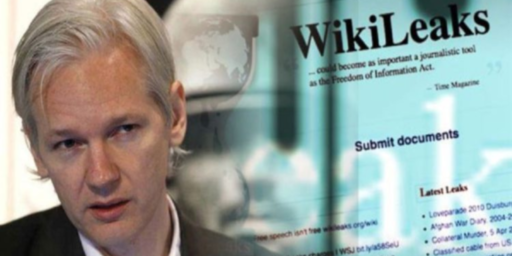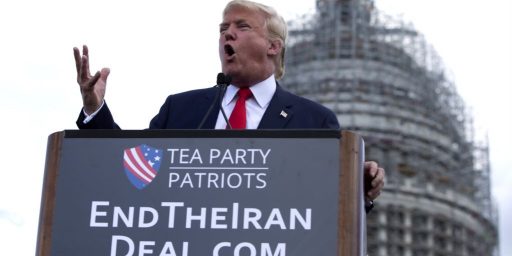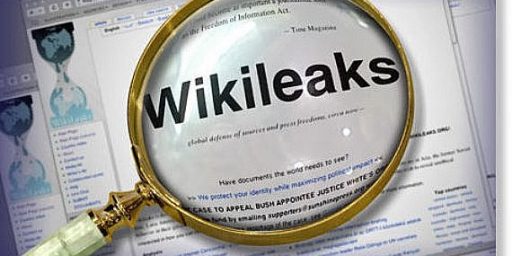Wikileaks Releases Diplomatic Cables, Revealing International Secrets
A new round of Wikileaks documents is out, and it opens the door on diplomatic correspondence previously hidden from the public.
Another massive Wikileaks document dump apparently stemming from the actions of Pvt. Bradley Manning has hit the web, this time it consists of State Department cables that reveal information that could have international ramifications:
WASHINGTON — A cache of a quarter-million confidential American diplomatic cables, most of them from the past three years, provides an unprecedented look at backroom bargaining by embassies around the world, brutally candid views of foreign leaders and frank assessments of nuclear and terrorist threats.
Some of the cables, made available to The New York Times and several other news organizations, were written as recently as late February, revealing the Obama administration’s exchanges over crises and conflicts. The material was originally obtained by WikiLeaks, an organization devoted to revealing secret documents. WikiLeaks intends to make the archive public on its Web site in batches, beginning Sunday.
The anticipated disclosure of the cables is already sending shudders through the diplomatic establishment, and could conceivably strain relations with some countries, influencing international affairs in ways that are impossible to predict.
Secretary of State Hillary Rodham Clinton and American ambassadors around the world have been contacting foreign officials in recent days to alert them to the expected disclosures. On Saturday, the State Department’s legal adviser, Harold Hongju Koh, wrote to a lawyer for WikiLeaks informing the organization that the distribution of the cables was illegal and could endanger lives, disrupt military and counterterrorism operations and undermine international cooperation against nuclear proliferation and other threats.
Among the more interesting revelations in the documents, and the ones most likely to raise eyebrows, are these:
¶ A dangerous standoff with Pakistan over nuclear fuel: Since 2007, the United States has mounted a highly secret effort, so far unsuccessful, to remove from a Pakistani research reactor highly enriched uranium that American officials fear could be diverted for use in an illicit nuclear device. In May 2009, Ambassador Anne W. Patterson reported that Pakistan was refusing to schedule a visit by American technical experts because, as a Pakistani official said, “if the local media got word of the fuel removal, ‘they certainly would portray it as the United States taking Pakistan’s nuclear weapons,’ he argued.”
¶ Gaming out an eventual collapse of North Korea: American and South Korean officials have discussed the prospects for a unified Korea, should the North’s economic troubles and political transition lead the state to implode. The South Koreans even considered commercial inducements to China, according to the American ambassador to Seoul. She told Washington in February that South Korean officials believe that the right business deals would “help salve” China’s “concerns about living with a reunified Korea” that is in a “benign alliance” with the United States.
¶ Bargaining to empty the Guantánamo Bay prison: When American diplomats pressed other countries to resettle detainees, they became reluctant players in a State Department version of “Let’s Make a Deal.” Slovenia was told to take a prisoner if it wanted to meet with President Obama, while the island nation of Kiribati was offered incentives worth millions of dollars to take in a group of detainees, cables from diplomats recounted. The Americans, meanwhile, suggested that accepting more prisoners would be “a low-cost way for Belgium to attain prominence in Europe.”
(…)
¶ A global computer hacking effort: China’s Politburo directed the intrusion into Google’s computer systems in that country, a Chinese contact told the American Embassy in Beijing in January, one cable reported. The Google hacking was part of a coordinated campaign of computer sabotage carried out by government operatives, private security experts and Internet outlaws recruited by the Chinese government. They have broken into American government computers and those of Western allies, the Dalai Lama and American businesses since 2002, cables said.
¶ Mixed records against terrorism: Saudi donors remain the chief financiers of Sunni militant groups like Al Qaeda, and the tiny Persian Gulf state of Qatar, a generous host to the American military for years, was the “worst in the region” in counterterrorism efforts, according to a State Department cable last December. Qatar’s security service was “hesitant to act against known terrorists out of concern for appearing to be aligned with the U.S. and provoking reprisals,” the cable said.
¶ An intriguing alliance: American diplomats in Rome reported in 2009 on what their Italian contacts described as an extraordinarily close relationship between Vladimir V. Putin, the Russian prime minister, and Silvio Berlusconi, the Italian prime minister and business magnate, including “lavish gifts,” lucrative energy contracts and a “shadowy” Russian-speaking Italian go-between. They wrote that Mr. Berlusconi “appears increasingly to be the mouthpiece of Putin” in Europe. The diplomats also noted that while Mr. Putin enjoys supremacy over all other public figures in Russia, he is undermined by an unmanageable bureaucracy that often ignores his edicts.
The cables also provide a glimpse into history that we haven’t seen yet:
In a 1979 cable to Washington, Bruce Laingen, an American diplomat in Teheran, mused with a knowing tone about the Iranian revolution that had just occurred: “Perhaps the single dominant aspect of the Persian psyche is an overriding egoism,” Mr. Laingen wrote, offering tips on exploiting this psyche in negotiations with the new government. Less than three months later, Mr. Laingen and his colleagues would be taken hostage by radical Iranian students, hurling the Carter administration into crisis and, perhaps, demonstrating the hazards of diplomatic hubris.
In 1989, an American diplomat in Panama City mulled over the options open to Gen. Manuel Noriega, the Panamanian leader, who was facing narcotics charges in the United States and intense domestic and international political pressure to step down. The cable called General Noriega “a master of survival”; its author appeared to have no inkling that one week later, the United States would invade Panama to unseat General Noriega and arrest him.
In 1990, an American diplomat sent an excited dispatch from Cape Town: he had just learned from a lawyer for Nelson Mandela that Mr. Mandela’s 27-year imprisonment was to end. The cable conveys the momentous changes about to begin for South Africa, even as it discusses preparations for an impending visit from the Rev. Jesse L. Jackson.
The voluminous traffic of more recent years — well over half of the quarter-million cables date from 2007 or later — show American officials struggling with events whose outcomes are far from sure. To read through them is to become a global voyeur, immersed in the jawboning, inducements and penalties the United States wields in trying to have its way with a recalcitrant world.
The cables also reveal that the United States has increased the use of diplomats in intelligence gathering in recent years, and detailed the extent to which two Administrations have struggled over the problem of Iran’s nuclear weapons program:
In day-by-day detail, the cables, obtained by WikiLeaks and made available to a number of news organizations, tell the disparate diplomatic back stories of two administrations pressed from all sides to confront Tehran. They show how President George W. Bush, hamstrung by the complexities of Iraq and suspicions that he might attack Iran, struggled to put together even modest sanctions.
They also offer new insights into how President Obama, determined to merge his promise of “engagement” with his vow to raise the pressure on the Iranians, assembled a coalition that agreed to impose an array of sanctions considerably harsher than any before attempted.
When Mr. Obama took office, many allies feared that his offers of engagement would make him appear weak to the Iranians. But the cables show how Mr. Obama’s aides quickly countered those worries by rolling out a plan to encircle Iran with economic sanctions and antimissile defenses. In essence, the administration expected its outreach to fail, but believed that it had to make a bona fide attempt in order to build support for tougher measures.
Feeding the administration’s urgency was the intelligence about Iran’s missile program. As it weighed the implications of those findings, the administration maneuvered to win Russian support for sanctions. It killed a Bush-era plan for a missile defense site in Poland — which Moscow’s leaders feared was directed at them, not Tehran — and replaced it with one floating closer to Iran’s coast. While the cables leave unclear whether there was an explicit quid pro quo, the move seems to have paid off.
There is also an American-inspired plan to get the Saudis to offer China a steady oil supply, to wean it from energy dependence on Iran. The Saudis agreed, and insisted on ironclad commitments from Beijing to join in sanctions against Tehran.
At the same time, the cables reveal how Iran’s ascent has unified Israel and many longtime Arab adversaries — notably the Saudis — in a common cause. Publicly, these Arab states held their tongues, for fearDenial-Of-Service attacks of a domestic uproar and the retributions of a powerful neighbor. Privately, they clamored for strong action — by someone else.
If they seemed obsessed with Iran, though, they also seemed deeply conflicted about how to deal with it — with diplomacy, covert action or force. In one typical cable, a senior Omani military officer is described as unable to decide what is worse: “a strike against Iran’s nuclear capability and the resulting turmoil it would cause in the Gulf, or inaction and having to live with a nuclear-capable Iran.”
Still, running beneath the cables is a belief among many leaders that unless the current government in Tehran falls, Iran will have a bomb sooner or later. And the Obama administration appears doubtful that a military strike would change that.
There’s apparently more to come over the next several days, including several stories that could have serious diplomatic consequences. One rumored story that may be contained in these or other documents, for example, is the claim that the Turkish Government was providing support for al Qaeda in Iraq and other insurgent groups at the same time that American troops were fighting them on the ground. Turkey is a NATO ally, of course, and a revelation like that could have serious consequences for U.S.-Turkish relations.
This latest document dump will also renew the controversy over Wikileaks itself, which has been ongoing ever since the first set of documents about Afghanistan came out during the summer. Private Manning remains in custody and is likely to be spending the rest of his life in prison for leaking all these documents, but Wikileaks itself is a creature of the Internet and not withstanding, it seems unlikely that the U.S. will ever really be able to shut it down, and I’m honestly not sure that it should.






One can think of a number of ramifications for this kind of thing, both good and ill. But one thing that cannot be disputed that is being brought to the fore, here. Accountability.
One can easily understand why the current administration would consider that a negative.
“One can easily understand why the current administration would consider that a negative.”
In the last 10,000 years of civilization, I’m not aware of one nation that practiced open-source diplomacy. Diplomatic bags, safe messaging, is thousands of years old.
It’s pretty crazy that someone, or some few, think they can just “try different” without negative outcomes.
I’d strongly recommend reading the coverage of this in The Guardian as well as the english-language version of Der Spiegel on-line. The Guardian, in particular, has a very useful database in the form of an interactive map that allows you to click on a country/location and see the cables (and articles about those cables) associated with it. Both papers also go into other areas of discussion that the New York Times has not covered yet (and to some degree vice versa).
As for Wikileaks themselves, I think they’re doing a valuable service. They’re exposing a lot of information on policymakers and politics with huge ramifications for the people back home in the US, and it’s not as they’re being wholly irresponsible about it. They chose to release it to newspapers for reporting and redaction, and are apparently staggering the release of the documents on their own website while they redact the names of people at risk.
Tying this to the Department of Homeland Security seizing the domains of file sharing sites (and a search engine for shared files), what is to prevent the government from declaring that Wikileaks is violating their copyright on these diplomatic cables and other documents, and then seizing the domain?
It would be a rather novel application of their newly claimed powers, but no more novel than the newly claimed powers themselves.
To the best of my knowledge nobody is claiming that some foreign power has stolen these papers or that they were stolen by foreign nationals. They appear to have been given over to Wikileaks by Americans with security clearances and axes to grind.
If you can’t preserve official secrets from unauthorized leaking of this sort, they aren’t secrets at all, any more than tacking them to the bulletin board of the New York Times would be. Seems to me the bigger problem isn’t that secrets are leaking but that things which little effort is being made at securing are being declared secret.
Gustopher,
The US government does not have copyright (or patent) protection on anything they produce, by law. All products of the US Government in the realm of intellectual property is considered to be in the public domain (although it is obviously still subject to classification as a secret)
> But one thing that cannot be disputed that is being brought to the fore, here.
That bithead is a mindless anti-Obama ranter?
The Saudis aren’t just writing the checks. They have consistently been the ones pulling the trigger, as well:
http://www.asecondlookatthesaudis.com
To the credit of the US government, the most secret the Wikileaks Cables get are “Secret-NOFORN”. If it had been thousands of “Top Secret” cables that had leaked, I’d be much more concerned.
The death of diplomacy. Which depends on confidentiality, which depends on the other guy’s ability to keep a secret. Without secrecy, there is no negotiation, as Jules Cambon famously wrote. One man-sized Australian sphincter has guaranteed that for the next 10 years at least no one can trust an American diplomat. How many unnecessary wars will be fought, how many good people will die because they could not trust? All for the sake of the ego of one man who claims to act in the name of peace and human rights. He has just effectively castrated the one good alternative to war.
Diplomacy is not democracy. It is necessarily anti-democratic.
As for those U.S. citizens who gave these cables to this man: treason. More guilty than Julius Rosenberg ever was.
But it is America’s government’s failure. A nation that can’t control its secrets or its borders hardly deserves to be treated as a major power. What was the reason we keep this dreadful beast called the CIA? Isn’t it supposed to be a watchdog of … something? Now what justification can it have, for all it costs us?
Does anyone know if what was handed over was actual files, or just digital transactions?
(Shrug)
Perhaps. Question that I’ve seen nobody address is, would it be better or worse than the state secrecy we have now and the consequences that engenders.
One can easily understand why the current administration would consider that a negative.
At least in terms of its dealings with Iran, this administration looks far more effective that the previous one.
The internet is one those “disruptive technologies”. It will be interesting to see how diplomatic processes adjust; or will free expression on the internet be trampled to support the old business model?
While there’s certainly information which need to be protected from release, one thing these leaks are making clear is that the classification system is widely being used to withhold information not because it’s release would damage national security, but to allow politicians to casually lie to the American public and to avoid dealing with important questions that should be decided by the nation as a whole, not by a small group of self selected officials.
It’s sad that this angle on the story hasn’t gotten more play in the new media.
What has happened to our classification system for sensitive documents that they can be accessed in bulk by some private? There is usually a “need to know” caveat attached to classified documents that is specific to the subject and originator of the document, in addition to such classsifications as SECRET NOFORN. Apparently these cables were dumped into a common pot that low level people had access to without NTK. Someone should be burned for this failure.